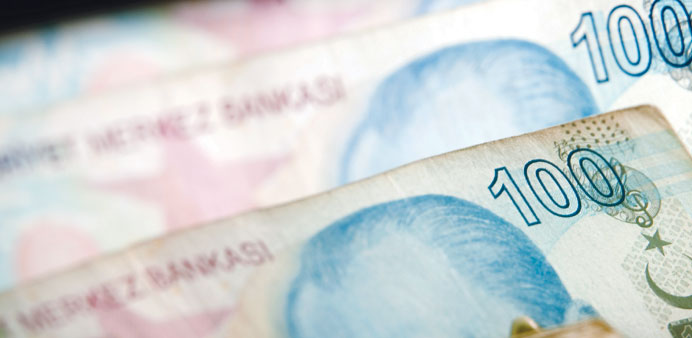A US-led strike against Syria risks widening Turkey’s current-account deficit and boosting capital outflows already being spurred by speculation that the Federal Reserve will cut asset buying.
The lira has fallen to record lows and benchmark two-year bond yields climbed above 10% for the first time since January 2012 last week following the biggest surge among emerging markets in the last three months.
Concern the conflict in Syria will intensify damped demand for riskier emerging-market assets, helping send currencies lower from South Korea’s won to the Indian rupee and Brazil’s real and driving oil to a two-year high. Turkey, which borders Syria and has supported rebels against President Bashar al-Assad, has said it could be part of a Western attack against the country over its alleged use of chemical weapons. Foreign investors sold $1.68bn of Turkish bonds since May, according to central bank data.
“Syrian turmoil is coming at a very bad time for Turkey,” Mohammed Kazmi, an emerging-markets strategist at Royal Bank of Scotland Group Plc in London, wrote in e-mailed comments last week. “Military action on Syria will affect Turkey’s economy through several channels, including consumer and business confidence, while elevated oil prices will negatively impact inflation and the current-account deficit.”
Turkey has been struggling to reduce its current-account gap, which widened to $35.9bn in the six months through June from $30bn in the same period a year earlier. The country may exceed its 2013 current-account gap projection of $60.7bn, Economy Minister Zafer Caglayan said on August 27.
“The intervention, however lengthy, will likely put significant short-term pressure on oil and energy prices, which will further boost the current-account deficit,” Timothy Ash, an emerging-markets strategist at Standard Bank in London, said in e-mailed comments last week.
West Texas Intermediate crude oil touched $112.24 a barrel on Wednesday, the highest price since May 2011, amid concern that any strike against Syria may affect crude exports from the Middle East region that produces 35% of the world’s oil.
An intervention by the North Atlantic Treaty Organisation in Syria would involve “significant use of the Turkish military and its assets by NATO forces,” Ash said. “In such a scenario, Turkey will be directly engaged in conflict with a neighbour, with uncertain consequences.” The yield on Turkey’s 10-year bond rose as much as 44 basis points to 10.72% on Wednesday, the highest since May 2010 and extending the advance this year to 362 basis points, the second-biggest increase after Indonesia among 20 emerging markets. Turkey’s central bank has sold $8.8bn in foreign exchange since June 11 to shore up the lira.
The currency has weakened 8.44% against the dollar in the past three months as speculation grew the Federal Reserve would scale back stimulus. Credit-default swaps on Turkey, which insure the country’s debt against non-payment, touched a 14- month high of 250 last Wednesday before ending the day up two basis points at 243.
“In the immediate term, there is the simple risk-off trade, which hurts Turkish financial assets,” Charles Robertson, London-based global chief economist at Renaissance Capital Ltd, said in an e-mailed response to questions last Wednesday. “But if this is a short operation, as seems likely, then we would expect these negative effects to last only a few days.”
Central bank Governor Erdem Basci’s comments last week that he will not raise interest rates this year would deter new investments in Turkey, according to RBS’s Kazmi.
“Until the central bank hikes rates significantly further, I would expect the lira to remain above the 2 level,” Kazmi said. “Lira volatility will prevent investors from entering the local bond market, while the possible further depletion of foreign-currency reserves is a credit negative, especially given the huge external financing requirement.”

